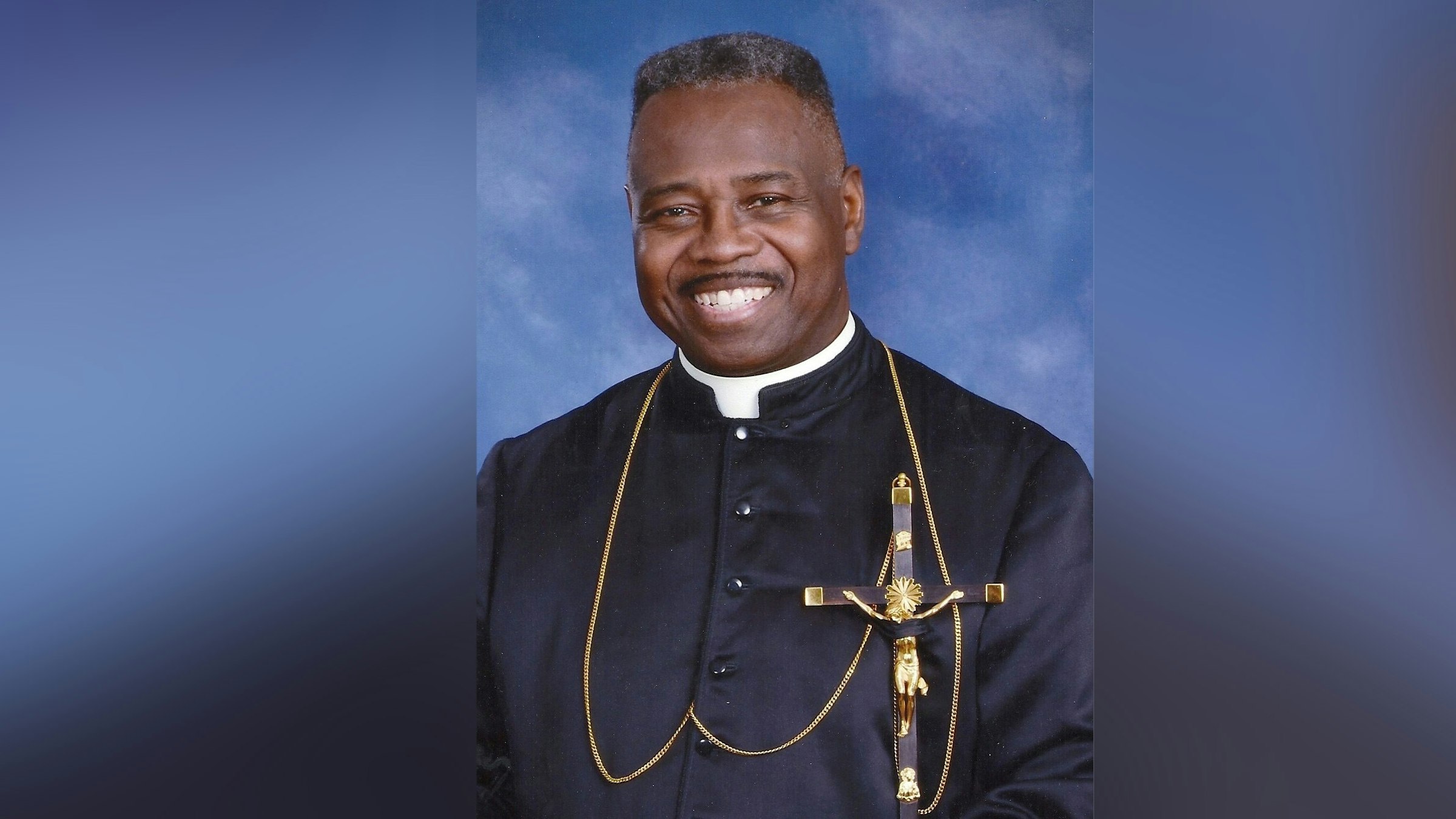Former director of Black Catholic Ministry for the Archdiocese of Detroit also founded annual Rev. Martin Luther King Jr. memorial
DETROIT — Fr. Clarence Williams Jr., CPPS, was a pioneer in the Black Catholic community, an astute scholar, and the driving force behind the Archdiocese of Detroit’s now-annual Rev. Martin Luther King Jr. memorial Mass.
A renowned storyteller who encouraged the Black Catholic community to tell its own story and asked congregations of all races to take a sober look at race relations in the Church, Fr. Williams’ advocacy for justice was felt at the parochial and archdiocesan levels.
Fr. Williams died July 8 at the age of 73.
Clarence Williams Jr. was born May 10, 1950, to Clarence and Lula Belle Williams in Tuscaloosa, Ala. He was raised in Cleveland, Ohio, and entered the Missionaries of the Precious Blood in 1965, being ordained a priest in Cleveland on Oct. 28, 1978.
Fr. Williams was sent to St. Anthony Parish in Detroit to serve as associate pastor, and later pastor, where he engaged in door-to-door evangelization around the neighborhood and developed an anti-racism program called Racial Sobriety, modeled after the 12 Step Program, where facilitators came to the parish to have honest and frank conversations about race in the Church.
“Fr. Clarence was a gifted storyteller,” John Thorne, former director of Black Catholic Ministry in the Archdiocese of Detroit and former executive director of the Detroit Catholic Pastoral Alliance, told Detroit Catholic. “He taught, even before I was educating on racism, that guilt has no place in any conversation on racism because it slows the process down. But he had that spark to get people to talk about how to change, bringing people together. Very much like Sr. Thea Bowman, he was always the bridge builder who founds ways to build bridges from the African-American community to other communities.”
It was during this time Fr. Williams began an annual Mass commemorating the legacy of the Rev. Martin Luther King Jr., a Mass the Archdiocese of Detroit continues to celebrate every year at the Cathedral of the Most Blessed Sacrament, along with the "Keep the Dream Alive" Awards, which were given to people from various faith backgrounds who personified King's hopes and dreams.
“I think it’s a testament to who he was as a priest, knowing he had a role, specifically in the Church, as a Black Catholic priest to go beyond the walls of the Church,” Thorne said. “He made sure the community knew he was there and he was with them. He was around the community of St. Anthony, connecting the neighborhood to the parish.”
Fr. Williams became the director of Black Catholic Ministry for the Archdiocese of Detroit in 1995, a time of challenge for many Black Catholics, as several urban parishes were being closed, merged or clustered. His own parish, St. Anthony, was being merged with other parishes on Detroit’s east side and eventually was closed in 2006.
It was that experience and perspective of being a pastor of a closed parish that made him an understanding and respected voice in the archdiocesan curia for Black Catholics going through the difficulties of parish mergers and closures.
“When he came down to the archdiocese, he was a trusted face in the community, and the community supported him, wholeheartedly,” Thorne said. “I always think about when we see our leaders, a lot of times they never tell us all the things they are going through because they are focused on keeping the community together. I know it was painful for him, but he saw an opportunity for hope. And coming to the Office of Black Catholic Ministry, he wanted us to continue to educate people on the history of Black Catholics, to have Black Catholics know and understand their history and place in the Church as a whole.”
Fr. Theodore Parker, of St. Charles Lwanga Parish in Detroit, met Fr. Williams when Fr. Parker was tasked with starting the Office of Black Catholic Ministry for the Diocese of Fort Wayne-South Bend, Ind., and Fr. Williams was hired as a consultant.
Fr. Williams and Fr. Parker would remain in close contact with each other throughout the years.
“Fr. Williams has always been my support, even when I was not needing it,” Fr. Parker said. “When I was in prison ministry in Fishkill Correctional (in New York), he would encourage me to go and get a doctorate."
“When coming to Detroit (in 2001), he was helpful in sorting out the people who would be most helpful to me,” Fr. Parker said concerning his relationship with the Office of Black Catholic Ministry when he came to St. Charles Lwanga (then St. Cecilia Parish). “Since he was here long before me, he understood Detroit and the Black Catholic people here. His advice was always the right advice.”
A big part of Fr. Williams’ mission was getting Black Catholics to take ownership of their faith and communities. He stressed to congregations that it is the role of Black Catholics in the Church to speak out against injustice and push fellow Catholics to be a more inclusive, welcoming body of Christ.
“A lot of times in the Black community, when we look at how we connect with the wider community, we always have to qualify ourselves,” Throne said. “But Fr. Williams said one of the things you can’t deny is history. He pushed to make sure we were part of the history of the Church. Not just the history of Black Catholics in Detroit, but the whole Church, to understand who the Black saints are, the powerful legacy and role they continue to play in the Church.”
Fr. Williams took his pastoral gifts out of the city of Detroit when he was named administrator and later pastor of Holy Innocents-St. Barnabas Parish in Roseville from 2010 to 2012, a parish that wasn’t predominately Black, but his experiences proved just as valuable to the wider Church.
“I didn’t know a whole lot about his time at St. Barnabas, but I know some were upset, asking why he wasn’t assigned to another city parish,” Thorne said. “But when I thought about it, I thought, ‘Oh, this is great. It’s an opportunity for the wider Church to see a Black Catholic priest, because so many of our priests stay in the city.’ We love our Black Catholic priests, and we know there aren’t many, but a priest is ordained for the whole Church. Even there, the same gifts he gave the Office of Black Catholic Ministry, at St. Anthony, he gave to St. Barnabas.”
Fr. Williams is survived by his father, Clarence E.; his brothers, Thomas D., Charles (Donna), Willie E. (Mercedes), and Carl (Cheryl); and numerous nieces and nephews, great-nieces and great-nephews. He is preceded in death by his mother, Lula Belle.
A funeral Mass was celebrated July 17 at the St. Charles Center in Carthagena, Ohio, in the Assumption Chapel, and a Mass of Christian Burial was celebrated July 18 at St. Adalbert Church in Cleveland. He was buried at Calvary Cemetery in Cleveland.
A memorial Mass was celebrated at St. Augustine and St. Monica Parish in Detroit on July 18.
Thorne said Fr. Williams will be remembered as a pioneer in speaking about race relations in the Church, citing his work with the United States Conference of Catholic Bishop and a document he helped create, “Racial Sobriety: A Journey from Hurts to Healing.”
“I always hope when we talk about anybody’s legacy, the work they have done will continue,” Thorne said. “Whether it’s talking about racial sobriety, or the module he helped write for the USCCB, I hope the work will continue.”











